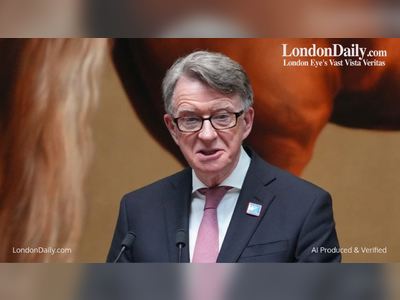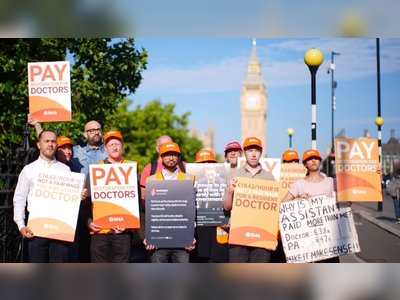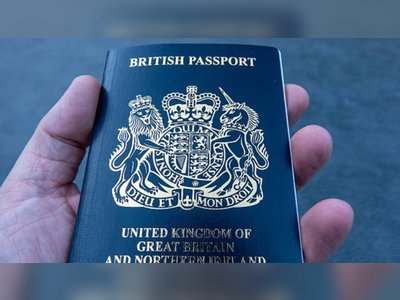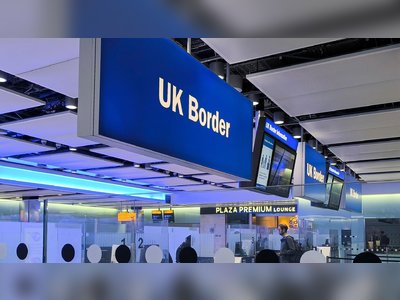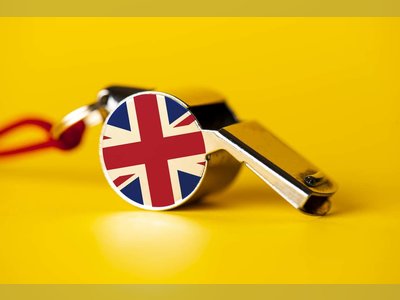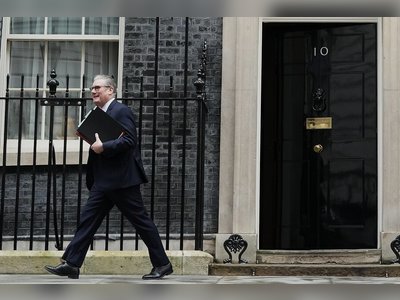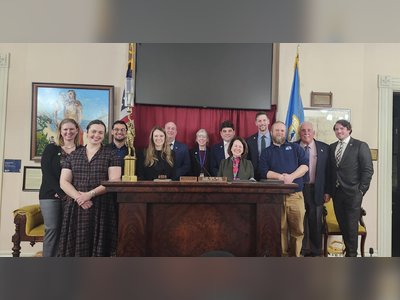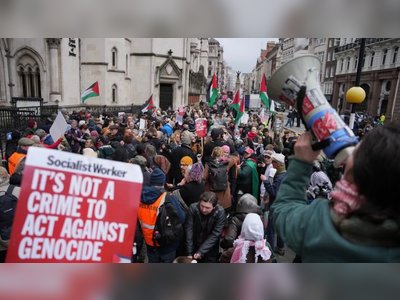
Tributes to slave traders and colonialists removed across UK
Scores of tributes to slave traders, colonialists and racists have been taken down or will be removed across the UK, a Guardian investigation has found, with hundreds of others under review by local authorities and institutions.
In what was described by historians as an “unprecedented” public reckoning with Britain’s slavery and colonial past, an estimated 39 names – including streets, buildings and schools – and 30 statues, plaques and other memorials have been or are undergoing changes or removal since last summer’s Black Lives Matter protests.
The movement to remove contentious landmarks has involved a wide section of society, from schools and universities to private landlords, pubs, churches, charitable trusts and councils.
They include a statue in the Guildhall of Sir John Cass and William Beckford – both had significant links to the slave trade – announced last week by the City of London, the kneeling black man sundial at Dunham Massey Hall and a statue of the colonial governor Thomas Picton, which is in the process of being removed from Cardiff City Hall.
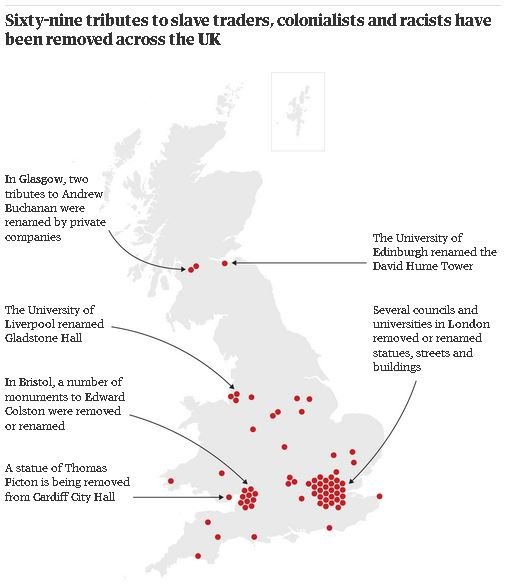
The University of Edinburgh has renamed the David Hume Tower because of the philosopher’s alleged racism; Imperial College London has stopped using its Latin motto, which can be translated as “scientific knowledge, the crowning glory and the safeguard of the empire”; University of Liverpool renamed its Gladstone Hall building due to the former prime minister’s links to slavery; and both London Metropolitan University and University of East London renamed schools associated with Cass.
Four streets – John Hawkins Square in Plymouth, and in London, Havelock Road, Black Boy Lane and Cassland Road Gardens – are being renamed. Councils across Scotland, England, and Wales are actively consulting on a further 21 streets.
Statues have been removed from two schools in England, six have changed their names because of links to slavery and colonialism, while seven others have removed “inappropriate” house names within schools.
Other removals of names deemed offensive include five pubs called Black Boy and one named Black’s Head, and two pet graves, including the black labrador dog mascot buried at RAF Scampton, whose name was a racial slur.
The Guardian understands the Bank of England is to remove from display portraits of governors and directors involved in the slave trade.
There are also audits and reviews under way into monuments and landmarks across the the country.
In November, the Welsh government identified 209 monuments, buildings or street names linked with slavery. The first minister, Mark Drakeford, said the audit was part of “a much bigger piece of work” that would consider how the nation moves forward.
Similar reviews have been commissioned by Glasgow city council, which predates the Black Lives Matter protests, and by the London mayor, Sadiq Khan, on the capital’s landmarks, and 130 Labour-led councils across the country, including the cities of Manchester and Birmingham. The Guardian data does not yet include the vast majority of iconographies being investigated in these reviews.
Hakim Adi, the first person of African heritage to become a professor of history in Britain, and now of Chichester University, said: “It is unprecedented. I can’t think of a similar movement to effect a reckoning with the glorification of slavery, colonialism, empire, human trafficking and crimes against humanity. I don’t think there’s ever been anything on this level nationally.”
The removals follow Black Lives Matter protests, which saw more than 260 towns and cities hold anti-racism protests in June and July. The demonstrations, including the toppling of the statue of the slave trader Edward Colston in Bristol, were the largest anti-racism protests in Britain for decades.
In some areas, the removals have been fiercely resisted by local residents. The campaign group Save Our Statues said it had helped to gather 195,000 signatures over 40 different petitions that have been debated at council meetings, which helped lead to decisions to keep the statues of Sir Francis Drake in Plymouth and Clive of India in Shrewsbury.
Earlier this month, the government announced plans to change the law to protect statues from what Robert Jenrick, the communities secretary, called “baying mobs”.
But Adi, who specialises in the history of Africa and the African diaspora, described attempts to remove monuments linked with slavery and racism as democracy in action, and criticised the government’s response.
“If the government is really concerned about inequality and racism, they would be the first to say yes, let’s put these statues in a special museum dedicated to crimes against humanity and stop glorifying people publicly.
“But they take the opposite view. So then you have to question everything they say about wanting a more just and equal society, a society without racism, because it’s just hypocrisy.”
In June, the archbishop of Canterbury announced a “very careful” review of statues at major places of worship. A John Gordon plaque at St Peter’s, Dorchester, that hailed his “bravery” for helping to quell the 1760 uprising by slaves across Jamaica, was covered up and in the process of being removed.
Robert Beckford, a professor of black theology at the Queen’s Foundation, welcomed the removal of these iconographies, but warned: “There’s the danger that the statues will go down and plaques will be removed, but the racist structures remain. I’m interested in a holistic response that enables us to keep in balance a recognition of how and why these statues were erected.
“And secondly, how we then deem the history in a way that is inclusive and just and providing us with a vision of what it means to be a multicultural, multi-ethnic nation.”
Sharon Heal, director of the Museums Association, said museums have a crucial role to play in hosting conversation and debate on these issues and providing historical context. “This isn’t erasure, it’s the deepening and a broadening of our understanding of Britain’s past and from a museum perspective gaining a deeper understanding of the objects and the collections that we hold,” she said.
“If you bring in multiple voices, whether that’s from UK communities, academia, or communities outside the UK, then you’re bound to uncover some really exciting, rich, diverse histories and stories that we hadn’t previously encountered.”
